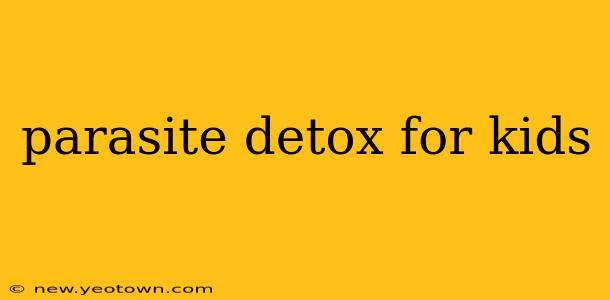The thought of your child harboring parasites is understandably unsettling. It conjures images of tiny invaders wreaking havoc on their little bodies, leading to discomfort, irritability, and even more serious health issues. While a parasite detox for kids isn't a simple one-size-fits-all solution, and always requires consulting a pediatrician first, this guide explores natural approaches parents can consider to support their child’s health and well-being, emphasizing preventative measures and holistic strategies. Remember, this information is for educational purposes and shouldn't replace professional medical advice.
What are Parasites in Children?
Parasites are organisms that live on or in a host and benefit at the host's expense. In children, these can range from intestinal worms (like pinworms or roundworms) to other less common types. These unwelcome guests can cause a range of symptoms, from mild digestive upset to more severe conditions, depending on the type and number of parasites.
Imagine it like this: a tiny thief has broken into your child’s body, stealing nutrients and causing chaos along the way. This disruption can manifest in various ways, making it crucial to pay attention to your child's well-being.
What are the Symptoms of Parasites in Children?
This section directly addresses a common parental concern. Recognizing symptoms early can be crucial in addressing any potential parasitic infections.
Common Symptoms of Parasites in Children:
- Stomach aches: Frequent or persistent abdominal pain is a common sign.
- Diarrhea or constipation: Alternating between loose stools and difficulty passing bowel movements can be indicative.
- Weight loss or poor appetite: If your child isn't gaining weight or showing decreased interest in food, it warrants investigation.
- Fatigue and lethargy: Constant tiredness and lack of energy can be a symptom.
- Itching around the anus: Particularly prevalent in pinworm infections.
- Sleep disturbances: Restless sleep or sleepwalking can sometimes occur.
- Unexplained rashes or skin problems: In some cases, skin issues can be linked to parasite infections.
- Nutritional deficiencies: Parasites can absorb nutrients intended for your child, leading to deficiencies.
How Can I Naturally Support My Child's Gut Health?
A healthy gut is the first line of defense against many health issues, including parasitic infections. This section focuses on holistic strategies to foster a thriving gut environment.
Dietary Strategies for a Healthy Gut:
- Focus on whole foods: A diet rich in fruits, vegetables, whole grains, and lean proteins strengthens the immune system.
- Probiotics: Incorporating foods rich in probiotics (yogurt, kefir, sauerkraut) can help populate the gut with beneficial bacteria. However, always consult your pediatrician before introducing probiotics, especially to younger children.
- Prebiotics: These types of fiber feed the beneficial bacteria in the gut, further strengthening its defenses. Look for foods like bananas, onions, and garlic.
- Limit processed foods, sugar, and artificial sweeteners: These negatively impact the gut microbiome.
Are there Herbs that can Support Parasite Detox in Children?
While the use of herbal remedies for parasite cleansing in children needs careful consideration and expert guidance, some herbs have traditionally been used to support gut health. It's imperative to consult a qualified healthcare professional before using any herbal remedies for children, as they can interact with medications or cause allergic reactions.
Herbs Traditionally Associated with Gut Health (Consult Your Doctor First):
This information is for educational purposes only and is not a recommendation for treatment. Always consult your pediatrician before using any herbal remedies.
Many herbs are purported to have properties that support healthy gut function, but their use in children requires cautious consideration and professional guidance due to potential interactions with medications or allergies.
What about over-the-counter medications?
There are over-the-counter medications available to treat specific parasitic infections. However, it's crucial to consult a doctor before administering any medication to your child, as they will be able to accurately diagnose the infection and determine the most appropriate and safe treatment. Self-treating can be dangerous and delay effective treatment.
When Should I Consult a Doctor?
This section underscores the importance of professional medical advice when dealing with suspected parasitic infections in children.
Seek immediate medical attention if your child exhibits:
- Severe abdominal pain
- Bloody stools
- Persistent vomiting
- High fever
- Signs of dehydration
- Significant weight loss
Prompt medical intervention ensures accurate diagnosis and appropriate treatment.
Remember, this information is intended for educational purposes and doesn't replace professional medical advice. Always consult your pediatrician or a qualified healthcare professional before starting any parasite detox or treatment regimen for your child. Early detection and proper medical care are crucial for ensuring your child's health and well-being.

